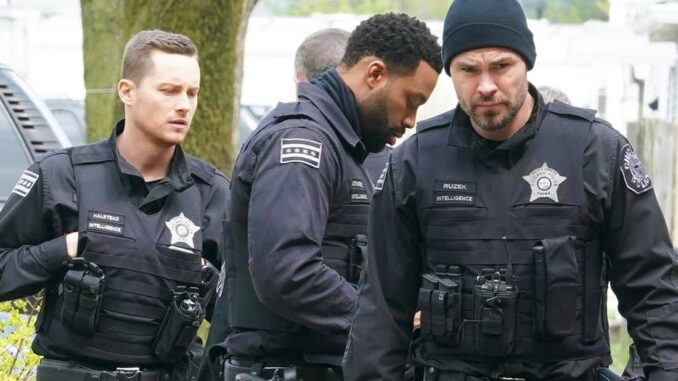
The Unyielding Pulse: Why Chicago PD Continues to Be a Fan Favorite After a Decade
In a landscape saturated with procedural dramas, where new shows vie for attention and old ones fade into memory, Chicago PD stands as a titan. Celebrating a decade on air, the Dick Wolf-produced series has not merely survived; it has thrived, maintaining a fiercely loyal fanbase that devours every tense interrogation, every adrenaline-fueled chase, and every gut-wrenching decision made by the Intelligence Unit. Its enduring appeal is not a fluke, but a testament to a potent cocktail of unflinching realism, deeply flawed yet relatable characters, an unbreakable sense of family, and the gritty, undeniable pulse of the city itself.
From its very inception, Chicago PD distinguished itself by refusing to paint law enforcement with a simple brush. Unlike many network procedurals that present a clear line between good and evil, PD plunges headfirst into the murky moral labyrinth of policing. Viewers are not just spectators; they are co-conspirators in the ethical dilemmas faced by Detective Sergeant Hank Voight and his team. Voight himself, portrayed with mesmerizing complexity by Jason Beghe, embodies this ambiguity. A man whose past is as dark as his methods are unconventional, he operates in the grey areas, often bending – or breaking – rules to achieve justice. This brutal pragmatism, while often controversial, resonates because it acknowledges the uncomfortable truth: sometimes, fighting monsters requires adopting a few of their tactics. This willingness to explore the "ends justify the means" argument, forcing viewers to grapple with their own moral compass, is a cornerstone of the show's gritty realism and a major draw for an audience weary of simplistic narratives.
Yet, even the most compelling setting and challenging narratives would fall flat without characters worth investing in. This is where Chicago PD truly shines. The members of Intelligence are not superheroes in uniform; they are individuals scarred by their work, haunted by their pasts, and deeply human in their vulnerabilities. We've watched Hailey Upton wrestle with her own demons and the emotional toll of deep undercover work. We've witnessed Kim Burgess's harrowing journey through trauma, loss, and incredible resilience, her evolution from patrol officer to a formidable detective. Kevin Atwater has navigated the complexities of being a Black officer in a predominantly white institution, constantly questioning and striving for change from within. These characters are not static; they grow, they falter, they make mistakes, and they learn – or sometimes don't. Their personal lives bleed into their professional ones, creating a palpable sense of stakes and making their triumphs all the more satisfying, their losses all the more heartbreaking. The audience isn't just watching a case unfold; they're watching a family struggle to hold itself together under immense pressure.
Indeed, the "family" dynamic within the Intelligence Unit is arguably the show's strongest adhesive. They bicker, they challenge each other, but when the chips are down, their loyalty is absolute. Voight, despite his gruff exterior, acts as a fiercely protective patriarch, willing to go to extraordinary lengths to shield his unit. This sacred bond, forged in the crucible of Chicago's most heinous crimes, provides an emotional anchor for the audience. Viewers long for that sense of unwavering support, that knowledge that no matter how dark the world gets, there’s a tight-knit group that has your back. Whether it's comforting a grieving colleague, covering for a mistake, or literally taking a bullet for one another, the unspoken pact of the Intelligence Unit is one of the most powerful and enduring reasons fans return, season after season. They don't just solve cases; they survive them, together.
Finally, and perhaps most viscerally, Chicago itself is an undeniable character in the show. The series is not just filmed in the Windy City; it breathes its air, navigates its streets, and reflects its soul. From the iconic elevated train tracks to the sprawling industrial landscapes, from the opulent high-rises to the struggling neighborhoods, the city's stark contrasts are woven into the very fabric of the storytelling. Chicago is presented not as a picturesque backdrop, but as a gritty, vibrant, and often dangerous metropolis that shapes the characters and the crimes they investigate. The specific challenges of policing in Chicago – the gang violence, the political corruption, the socio-economic disparities – are integral to the show's authenticity. This deep integration makes the series feel grounded, immediate, and utterly unique among its peers.
After a decade, Chicago PD continues to resonate because it understands the human condition in extreme circumstances. It’s a show that doesn't offer easy answers but demands engagement. It pulls back the curtain on the sacrifices, the ethical compromises, and the unwavering bonds forged in the pursuit of a difficult justice. It's a testament to powerful storytelling that prioritizes character over cliché, realism over fantasy, and the unyielding pulse of a city over superficial gloss. For its devoted fans, Chicago PD isn't just a TV show; it's a visceral, ongoing conversation about right and wrong, loyalty and loss, and the enduring strength of a chosen family facing down the darkness, one shift at a time.
